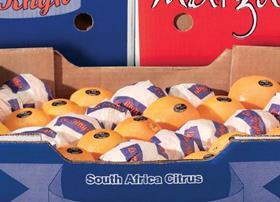
South African citrus supplies directly into southern European countries could be in the balance if there is no progress next week during crucial South African and EU meetings in Europe.
The South Africans are hoping that the outstanding issues regarding last season's interceptions are resolved. They are also insisting on access to southern European technical facilities where interceptions for citrus black spot (CBS) are handled, where access has been denied in the past. This, they say, is vital in order for them to have confidence in the processes undertaken, with regards to CBS inspection and reporting on EU borders.
Since South Africa's citrus growers returned from their summer break, industry leaders have been inundated with concerns, suggestion and questions on the CBS situation for 2015, and the impact of this on market access to Europe and the US.
Most of these concerns centre around rumours that South Africa may not be supplying countries in southern Europe through ports in this region. This was fuelled by the reportedly high number of interception incidents in these countries last year, when compared with those in northern European ports. Indeed, there is a perception that the risk of CBS interceptions in the south is much higher than in the north.
South Africa is reportedly, in principle, committed to supplying all markets normally as demand dictates during the coming season, and wants to avoid a selective marketing campaign. However, reports say, the situation in southern Europe is very difficult and may force the country's hand. Talks next week will be aimed at clearing up any outstanding issues and mistrust related to last season, before a final strategy will be put to the South African citrus industry early in March.
It has emerged that the 2014 citrus season in Europe ended with 28 official notifications of interceptions from the EU’s DG Sanco to South Africa’s Department of Agriculture, Forestry and Fisheries (DAFF).
A number of the 28 CBS interceptions, especially towards the end of the season, were tested for viability. However, only one sample, reported in France during the 2014 campaign, was found to have viable CBS.
South African industry sources say the industry views the situation, with only one viable CBS organism intercepted in the EU in 2014 following a huge input made by growers, DAFF and importers, as showing significant risk mitigation on the disease by the EU. As such, South Africa is unhappy that it is currently denied access to some southern state testing institutions which verify possible CBS cases. “This casts unnecessary doubt on mythology and process with regards to CBS inspection and reporting on EU borders,' sources note.
South African sources say DG Sanco repeatedly argued during the 2014 campaign that the SA citrus Industry should have utmost confidence in the sampling and inspection process leading up to a reported CBS interception notifications.
They say South Africa was given access to the German and Dutch laboratories in August 2014 but denied access to Spanish and Italian facilities. Additionally France, Portugal and the UK are currently on the programme for new expert visits to verify processes in their institutions.
During the South African expert visit in August, they found the testing and procedures followed in the Netherlands and Germany in line with international protocols, and noted that the institutions and officials involved were administering the processes in an exemplary way.
Following repeated offers from DG Sanco to provide access to EU institutions during the December CGA delegation visit to Brussels, the industry requested DAFF to finalise the visits to Spain, Italy, Portugal, France and UK in January and, potentially, February this year. Industry sources explain this is vital because there remaina huge question marks over the manner and reporting of CBS interceptions in some cases.
The South African view is that this expert visit is necessary to finalise the country's report to DG Sanco on the 2014 season. Only after its conclusion can the Standing Committee on Plant Health Review, for better or worse, change aspects of the current regulation administering the requirements for South African citrus shipments to the EU.
One citrus source says that if the uncertainty is not removed, South Africa will have to decide whether it wants to risk 85 per cent of its exports, because the 15 per cent that is supplied directly into southern Europe may result in interceptions which could halt the whole programme.






No comments yet